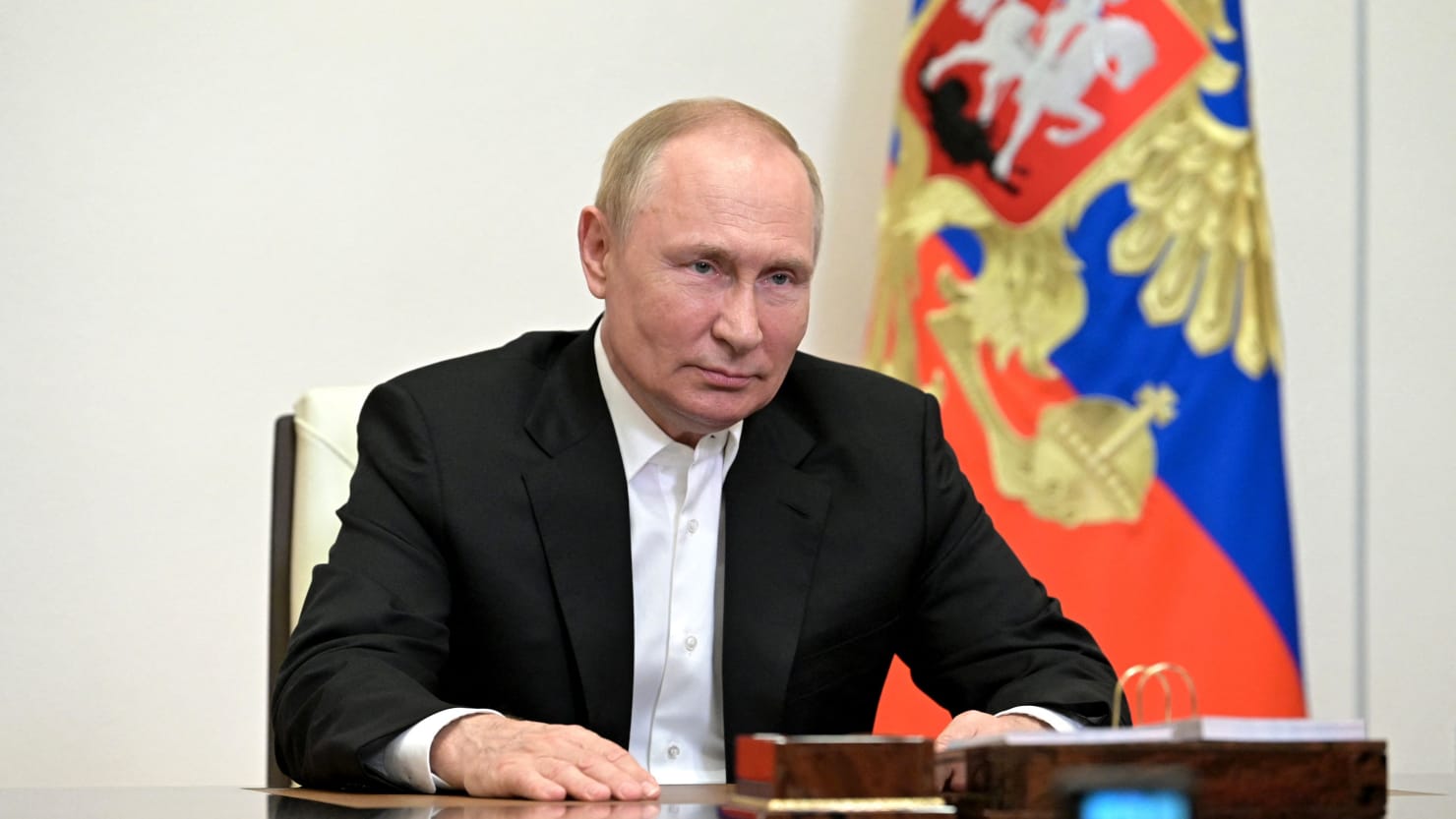Nearly six months into Russia’s bloody war against Ukraine, it appears Vladimir Putin has pinned his hopes for claiming victory on a self-described “organized crime syndicate” that is now trawling prisons for cold-blooded killers and deploying mercenaries to straighten out fed-up troops.
That’s according to several explosive new reports out Thursday by the independent Russian investigative news outlets iStories and The Insider, both of which uncovered disturbing new details about the notorious Wagner Group’s alleged role in the war.
After myriad reports in recent weeks that Kremlin-linked businessman Yevgeny Prigozhin has been personally touring Russian prisons and promising inmates full amnesty if they fight for Wagner in Ukraine, a staffer at a high-security penal colony in the Tula region has revealed the real reason behind the desperate recruiting drive.
Identified only as Ivan, the staffer told The Insider that Prighozhin had visited personally on July 24 and told inmates the regular Russian military was “weakening” and “cannot cope” with the war.
Prighozin said he’d been given an order by President Putin “to use all possible resources” to win the war, Ivan was quoted saying.
“He called his organization an organized crime group and talked a lot about the advantage of participating in war through them. Honestly, I thought it was a surrealistic dream. A man who had a Hero of Russia star pinned to his T-shirt, was telling us loud and clear about what was going on in our country. That gangsters are really in power and they don’t give a fuck about any human rights organizations like Gulagu.net or the Committee of Soldiers’ Mothers,” he said.
“I’m not afraid to say, we’re an organized crime group that helps the Russian army,” another inmate, Alexei, quoted Prighozin as saying.
Sergei, an inmate at a penal colony in Bryansk, was quoted telling the outlet he’d desperately tried to join Wagner but was ultimately rejected and had come to realize that was a good thing.
The recruiters, he’d said, had announced they were looking for inmates convicted of murder, to be sure that they’d be prepared to kill again.
“Out of 400 people they took 150. I passed all of the tests, I passed the commission, but at the last stage FSB officers came, and they rejected me because of my tattoos, I had a swastika tattoo. I think they were accepting those who had nothing to lose, but I was unlucky,” he was quoted saying.
He went on to say that, after talking to more people outside of prison about the war, he’d learned no one was getting paid the compensation they were promised and that it was all really just a “meat grinder.”
“On TV they show one thing, but in reality everything is probably different,” he said.
Human rights groups and inmates alike have both also expressed concerns that the Wagner recruiting drive that has so far been voluntary may soon become forced. A friend of an inmate in Plavsk interviewed by Mediazona earlier this month said Wagner representatives had told prisoners they’d be back for another visit in two or three months if they “run out” of inmates from the first wave of recruitment.
So far, according to the independent outlet Verstka, which has also closely covered the alleged Wagner recruiting drive, the mercenary group has recruited more than 1,000 inmates at 17 different penal colonies throughout Russia.
Long accused by Western officials and investigative journalists of financing Wagner, Prigozhin has denied having any links to the paramilitary force, a shadowy group that has left a long trail of war crimes allegations in its wake in Ukraine, Syria and the Central African Republic.
Wagner has also been deployed to crack down on regular Russian troops trying to ditch the war, according to soldiers interviewed by iStories.
Family members of Russian soldiers and some soldiers themselves say Wagner mercenaries have been guarding makeshift camps in the occupied Luhansk region where troops who try to leave the war are being held against their will in basements.
Dmitry, the father of a soldier who wound up at such a camp in Bryanka, told iStories his son became alarmed after arriving and noticing the set up.
“In Bryanka, they were first told that [military] posts had been set up because they were guarding against all sorts of [Ukrainian sabotage and reconnaissance groups]. And then they saw that all the posts were deployed inside the camp. Roughly speaking, the firing zone was inward,” he said.
Dmitry said his son was repeatedly beaten for refusing to go back to the front—and was at one point dragged off to face execution.
“They said, ‘Lie down on the ground so your brains don’t splatter everywhere, and count to ten,’” he recalled. After he refused to do so, they bashed him over the head, he said.
Sergei, a Russian soldier who said he also wound up at the camp after telling the military command he wanted out of the war, told iStories he’d seen captives snatched up and taken in an “unknown direction” by men he identified as Wagner fighters, one of whom wound up dead on his way to the front line, supposedly from shelling.
He said troops at the camp, including himself, first went through questioning by commanders and “psychologists” who tried to convince them to join Wagner, but if that didn’t work, they’d be handed over to Wagner mercenaries.
“They really beat guys there with truncheons in basements… They say: ‘We will kill you, nothing will happen to us for it. Nobody knows you’re here,’” he said.
Sergei, who eventually made it back to Russia and has filed a complaint with military prosecutors, along with several other troops, said he’d come to realize the camps had all been set up with one goal in mind: forcing troops into Wagner.
Of the second camp he said he was held at in Luhansk, he said: “We found out that this place was called a ‘center for psychological support for military personnel,’ but in reality it was just recruitment for Wagner.”
He and other soldiers who escaped say they are now disgusted by the Russian leadership they once swore allegiance to—and that disillusionment set in almost immediately after many of them arrived in Ukraine and realized what was really happening there.
“Do you understand that we’re really the fascists?” Sergei recalled telling a fellow soldier. “He said, ‘I was scared to say the same thing to you, I thought you’d shoot me. Yes, we’re the fascists, and I realize that.”



